一般将来时语法讲解
英语语法 什么是一般将来时

英语语法什么是一般将来时一般将来时(Simple Future Tense)是英语语法中用来表示将来发生的动作、事件或状态的一种时态。
它在句子中起着重要的作用,可以帮助我们准确描述未来的计划、意图或预测。
在这篇文章中,我将详细探讨一般将来时的用法和构造,以及一些常见的例子。
请注意,这是一个详细的讨论,所以文章会比较长。
让我们开始吧!一、一般将来时的构造一般将来时的构造非常简单,主要由助动词"will"或"shall"加上动词的原形构成。
下面是一些例子:1. I will go to the party tomorrow.我明天会去参加派对。
2. She will study abroad next year.她明年会出国留学。
3. They will visit their grandparents this weekend.他们这个周末会去看望他们的祖父母。
4. We shall meet at the park.我们将在公园见面。
5. He will not come to the meeting.他不会来参加会议。
6. Will you help me with my homework?你会帮我做作业吗?二、表示计划和意图一般将来时常常用来表示将来的计划、意图或打算。
下面是一些例子:1. We will have a meeting tomorrow.我们明天会开会。
2. She will start a new job next month.她下个月会开始一份新工作。
3. They will travel to Europe next summer.他们明年夏天会去欧洲旅行。
4. I will buy a new car next year.我明年会买辆新车。
5. He will learn to play the piano.他会学弹钢琴。
6. We shall visit our friends in the evening.我们晚上会去拜访我们的朋友。
初二英语语法分析--一般将来时用法讲解
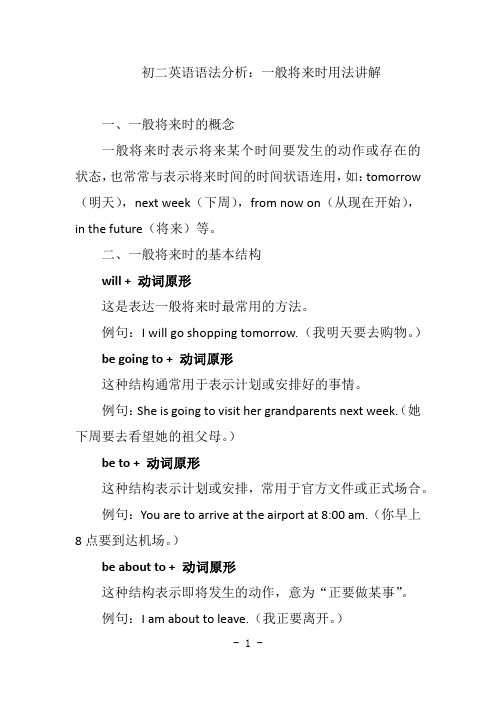
初二英语语法分析:一般将来时用法讲解一、一般将来时的概念一般将来时表示将来某个时间要发生的动作或存在的状态,也常常与表示将来时间的时间状语连用,如:tomorrow (明天),next week(下周),from now on(从现在开始),in the future(将来)等。
二、一般将来时的基本结构will + 动词原形这是表达一般将来时最常用的方法。
例句:I will go shopping tomorrow.(我明天要去购物。
)be going to + 动词原形这种结构通常用于表示计划或安排好的事情。
例句:She is going to visit her grandparents next week.(她下周要去看望她的祖父母。
)be to + 动词原形这种结构表示计划或安排,常用于官方文件或正式场合。
例句:You are to arrive at the airport at 8:00 am.(你早上8点要到达机场。
)be about to + 动词原形这种结构表示即将发生的动作,意为“正要做某事”。
例句:I am about to leave.(我正要离开。
)be due to + 动词原形这种结构表示某事预定或预期将要发生。
例句:The train is due to arrive at 5:00 pm.(火车预定下午5点到达。
)三、一般将来时的用法1表示将来的动作或状态例句:I will buy a new car next year.(明年我要买一辆新车。
)2表示将来的计划或安排例句:We are going to have a picnic this weekend.(我们这个周末要去野餐。
)3表示根据现有情况推测未来的可能性例句:It's going to rain soon.(很快就要下雨了。
)4表示命令、请求、建议等例句:You are to finish your homework before you go out.(你出去之前要把作业做完。
英语语法:一般将来时解释集

英语语法:一般将来时解释大全一、基本定义一般将来时是英语时态的一种,表示将来的动作或状态。
它主要用于描述未来的计划、预测或期望发生的事情。
二、形式构成一般将来时的构成主要有以下几种形式:1. 基本结构:主语+ will /shall + 动词原形+ 其他成分。
这是最基本的一般将来时形式,表示将来的动作或状态。
2. be going to 结构:主语+ be(am, is, are)going to + 动词原形+ 其他成分。
这种结构表示计划或安排将要发生的事情,也可以表示根据目前的迹象或情况预测将会发生的事情。
3. be+动词不定式:主语+ be(am, is, are)to + 动词原形+ 其他成分。
这种结构表示计划或安排将来要做的事情。
4. be+动词ing:主语+ be(am, is, are)+ 动词ing形式+ 其他成分。
这种结构表示即将发生的动作,通常与“when”连用。
5. be+表示时间的介词短语:主语+ be(am, is, are)+ 表示时间的介词短语。
这种结构用于表示将来某个时间点的情况。
6. 将来时间状语:tomorrow, next week, in the future等以上就是一般将来时的主要构成形式。
需要注意的是,在具体使用时,应根据语境和上下文选择合适的构成方式。
三、用法场景1. 表达未来的计划或意图,例如:I will go to the beach next summer.2. 描述未来的预测或期望,例如:It will rain this afternoon.3. 在条件句中表示将来的结果,例如:If you study hard, you will pass the exam.四、与其他时态的区别1. 与现在进行时态的区别:现在进行时态强调正在进行的动作,而一般将来时态强调将来的动作或状态。
2. 与过去时态的区别:过去时态表示过去的动作或状态,与将来时间无关。
小学英语语法时态一般将来时详解

小学英语语法时态一般将来时详解一、概念一般将来时表示将来某一时刻的动作或状态;或将来某一段时间内经常的动作或状态..一般将来时由助动词shall第一人称;will第二、三人称+动词原形构成..美国英语则不管什么人称;一律用will..二、一般将来时的形式●will 常简略为'll;并与主语连写在一起;如:I'll;he'll;it'll;we'll;you'll;they'll..●一般疑问句如用Will you…其简略答语须是Yes;I will或 No;I will not;如用 Shall you…较少见其简略答语须是 Yes;I shall.或 No; I shall not...三、一般将来时的用法1表示将来的动作或状态一般将来时常与一些表示将来的时间状语连用;如:tomorrow明天; next week 下周; from now on从现在开始;in the future将来等..2表示将来经常发生的动作..一般将来时表示将来某一时刻的动作或状态;其表达形式除了“shall第一人称;will第二、三人称+动词原形构成”外;还有以下几种形式..1“to be going to+动词原形”表示即将发生的或最近打算进行的事..例如:①It is going to rain. 要下雨了.. ②We are going to have a meeting today. 今天我们开会..2go;come;start;move;sail;leave;arrive;stay等可用进行时态表示按计划即将发生的动作;例如: I'm leaving for Beijing. 我要去北京..3“be to+动词原形”表示按计划要发生的事或征求对方意见..例如:①Are we to go on with this work 我们继续干吗②The boy is to go to school tomorrow.这个男孩明天要去上学..4“be about to+动词原形”表示即将发生的动作;意为:很快;马上..后面一般不跟时间状语..例如: We are about to leave.我们马上就走..5某些词;如come; go; leave; arrive; start; get; stay 等的一般现在时也可表示将来..①The meeting starts at five o'clock.会议五点开始..②He gets off at the next stop.他下一站下车四、一般将来时特点1shall用于第一人称;常被will 所代替..will 在陈述句中用于各人称;在征求意见时常用于第二人称..Which paragraph shall I read first Will you be at home at seven this evening2be going to +不定式;表示将来..a. 主语的意图;即将做某事..What are you going to do tomorrowb. 计划;安排要发生的事..The play is going to be produced next month..c. 有迹象要发生的事Look at the dark clouds; there is going to be a storm.3be +不定式表将来;按计划或正式安排将发生的事.. We are to discuss the report next Saturday.4be about to +不定式;意为马上做某事.. He is about to leave for Beijing.注意:be about to 不能与tomorrow; next week 等表示明确将来时的时间状语连用..五、一般将来时常见用法1、表示将要发生的动作..例如:I shall go to see a friend this evening.2、shall用于第一人称作主语的问句里;表示征求对方的意见或询问情况..例如:Shall I open the door3、will用于第二人称的问句里;征求对方是否愿意或表示客气的邀请或命令..例如:Will you please read the word4、be going to打算、准备做某事或即将发生的事..例如:We are going to plant trees.这种时态由be的将来时形式+现在分词构成..如主语为第一人称;除在疑问句外will要比shall更常用.可用做一般进行时;也可表示不含意图又未发生的动作..5、be to do按计划安排要发生的事或征求对方意见..例如:When is the swimming pool to open6、be going在go;come;leave;stay等按计划安排要发生的事中..这些动词经常具有趋向性..例如:They are leaving here tomorrow.。
英语语法一般将来时的讲解
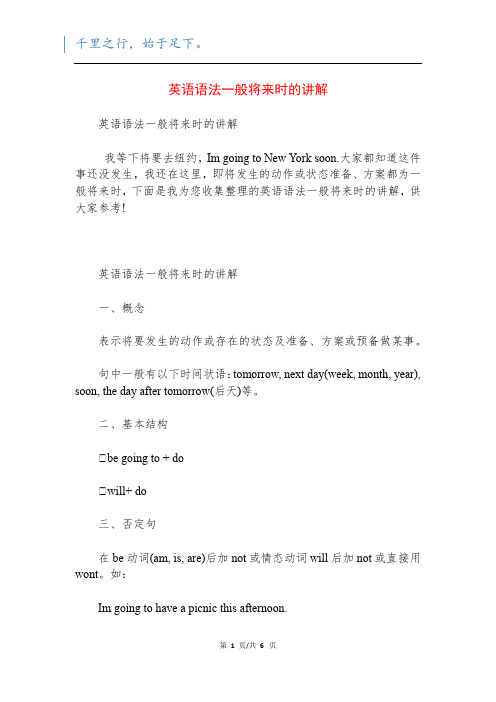
英语语法一般将来时的讲解英语语法一般将来时的讲解我等下将要去纽约,Im going to New York soon.大家都知道这件事还没发生,我还在这里,即将发生的动作或状态准备、方案都为一般将来时,下面是我为您收集整理的英语语法一般将来时的讲解,供大家参考!英语语法一般将来时的讲解一、概念表示将要发生的动作或存在的状态及准备、方案或预备做某事。
句中一般有以下时间状语:tomorrow, next day(week, month, year), soon, the day after tomorrow(后天)等。
二、基本结构①be going to + do①will+ do三、否定句在be动词(am, is, are)后加not或情态动词will后加not或直接用wont。
如:Im going to have a picnic this afternoon.Im not going to have a picnic this afternoon.I will go to have a picnic tomorrow.I will not/wont go to have a picnic tomorrow.四、一般疑问句be或will提到句首,some改为any, and改为or,第一二人称互换。
如:We are going to go on an outing this weekend.Are you going to go on an outing this weekend?五、对划线部分提问。
一般状况下,一般将来时的对划线部分有三种状况。
1. 问人。
Who 如:Im going to New York soon.Whos going to New York soon?2. 问干什么。
What 如:My father is going to watch a race with me this afternoon.What is your father going to do with you this afternoon?3. 问什么时候。
“一般将来时”的几种语法形式知识讲解

“一般将来时”的几种语法形式“一般将来时”的几种语法形式初中英语中表示一般将来时的语法形式有四种:shall/will+动词原形;be going to+动词原形;现在进行时和一般现在时。
现将这四种形式分述如下:一.shall/will+动词原形1.will可用于所有人称,但shall仅表示单纯将来时,用于第一人称I和we,作为will的一种替代形式。
以You and I为主语时通常避免用shall。
例如:He will be back soon.他很快就会回来。
I shall/will be free on Sunday.星期天我有空。
You and I will work in the same factory.你和我将在同一工厂工作。
2.will,shall可用来预言将来发生的事。
如说出我们设想会发生的事,或者请对方预言将要发生什么事。
例如:It will rain tomorrow.明天将要下雨。
3.will,shall除可表示单纯的将来时以外,还可以带有意愿的色彩,仍指的是将来。
例如:I’ll buy you a bicycle for your birthday.你过生日时,我给你买一辆自行车。
(表示允诺)Will you open the door for me please?请你帮我开门好吗?(表示请求)Shall I get your coat for you?我可以为你拿外套吗?(表示提议)二.be going to+动词原形1.表示说话人根据现在已有的迹象,判断将要或即将发生某种情况。
这类句子的主语可以是人,也可是物。
例如:There is going to be a football match in our school tomorrow afternoon.明天下午我们学校将有一场足球赛。
(已有告示)I feel terrible.I think I’m going to die.我感到难受极了,我想我快不行了。
一般将来时语法知识讲解
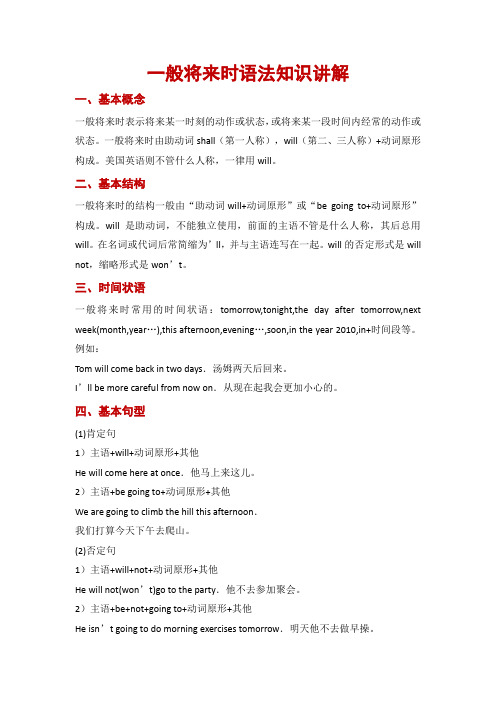
一般将来时语法知识讲解一、基本概念一般将来时表示将来某一时刻的动作或状态,或将来某一段时间内经常的动作或状态。
一般将来时由助动词shall(第一人称),will(第二、三人称)+动词原形构成。
美国英语则不管什么人称,一律用will。
二、基本结构一般将来时的结构一般由“助动词will+动词原形”或“be going to+动词原形”构成。
will是助动词,不能独立使用,前面的主语不管是什么人称,其后总用will。
在名词或代词后常简缩为’ll,并与主语连写在一起。
will的否定形式是will not,缩略形式是won’t。
三、时间状语一般将来时常用的时间状语:tomorrow,tonight,the day after tomorrow,next week(month,year…),this afternoon,evening…,soon,in the year 2010,in+时间段等。
例如:Tom will come back in two days.汤姆两天后回来。
I’ll be more careful from now on.从现在起我会更加小心的。
四、基本句型(1)肯定句1)主语+will+动词原形+其他He will come here at once.他马上来这儿。
2)主语+be going to+动词原形+其他We are going to climb the hill this afternoon.我们打算今天下午去爬山。
(2)否定句1)主语+will+not+动词原形+其他He will not(won’t)go to the party.他不去参加聚会。
2)主语+be+not+going to+动词原形+其他He isn’t going to do morning exercises tomorrow.明天他不去做早操。
(3)一般疑问句1)Will+主语+动词原形+其他?Will he help you with your English?他会帮助你学习英语吗?2)Be动词(Am,Is,Are)+主语+going to+动词原形+其他?Are you going to play computer games tomorrow afternoon?你打算明天下午玩电脑游戏吗?(4)特殊疑问句:疑问词+一般疑问句?—What will the students have for lunch today?学生们今天午饭吃什么?—They will have bread.他们将吃面包。
语法讲解一般将来时

be doing结构表示将来时间
表示按计划安排即将发生的动作
The train is leaving at 5 o'clock.
表示根据时间表或日程安排即将发生的动作
The plane is taking off in 10 minutes.
表示按计划或约定即将发生的动作
We are meeting at the restaurant at 7 tonight.
go D. will, do, go
选择题练习
答案:D
解析:根据时间状语this weekend,第一空应使用将来时态;第二空是be doing表 示将来;第三空表示个人意愿,应使用一般现在时态。
翻译练习
我将在下个月去旅行。 答案:will go
I _____ _____ on a trip next month.
1 2
表示意愿或承诺做某事
I will help you with your project if you need me.
表示临时决定做某事
I will go to the store later, I don't have any milk left.
3
表示假设条件下的将来行动
If you don't mind, I will stay for dinner.
语法讲解一般将来时
目录
• 引言 • 一般将来时的定义和构成 • 一般将来时的基本用法 • 一般将来时的特殊用法 • 一般将来时的否定句和疑问句形式 • 练习和巩固
01
引言
主题简介
一般将来时是英语语法中的一种时态,用于描述将来发 生的事件或动作。
它通常由助动词will或shall后接动词原形构成,表示未 来的行为或状态。
英语语法一般将来时讲解

英语动词时态详解:一般将来时一、一般将来时的定义一般将来时表示在现在看来即将要发生的动作或存在的状态。
常用时间副词tomorrow, soon或短语next year / week / month, in a few days, in the future, sometime做状语。
如:What will you do this afternoon. 你今天下午干什么?We will have a meeting tomorrow. 我们明天要开会。
He is going to study abroad next year. 明年他要出国学习。
二、一般将来时的构成1.肯定句:主语+will/shall+动词原型(一般shall用于第一人称,will用于各种人称)We shall have a lot of rain next month. 下个月将下很多雨。
I think she will pass the exam. 我想他考试会及格的。
2.否定句:主语+shall/will+not+动词原形We shall not (shan’t)go to China next year.XiaoMing will not(won’t) be back in few days.3.一般疑问句:Shall/Will +主语+动词原形+…?Shall we play volleyball next class? 下一节课我们将打排球吗?—Yes,you will. 是的,你们将.Will you come here next week? 下个星期你将来这儿吗?—Yes,I will. 是的,我将.Will she teach us this term? 这学期,她将教我们吗?—Yes,she will. 是的,她将.4.特殊疑问句:What(When,Where,How...)+will/shall+主语+动词原形+...?What will you do next week?下个星期你将要做什么?—I will do my homework。
一般将来时语法知识点
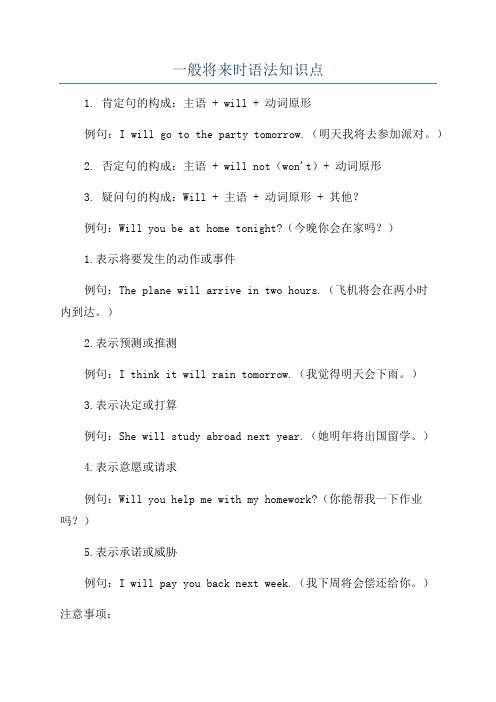
一般将来时语法知识点1. 肯定句的构成:主语 + will + 动词原形例句:I will go to the party tomorrow.(明天我将去参加派对。
)2. 否定句的构成:主语 + will not(won't)+ 动词原形3. 疑问句的构成:Will + 主语 + 动词原形 + 其他?例句:Will you be at home tonight?(今晚你会在家吗?)1.表示将要发生的动作或事件例句:The plane will arrive in two hours.(飞机将会在两小时内到达。
)2.表示预测或推测例句:I think it will rain tomorrow.(我觉得明天会下雨。
)3.表示决定或打算例句:She will study abroad next year.(她明年将出国留学。
)4.表示意愿或请求例句:Will you help me with my homework?(你能帮我一下作业吗?)5.表示承诺或威胁例句:I will pay you back next week.(我下周将会偿还给你。
)注意事项:1.一般将来时用于表示客观事实或不可避免的事情,而不适合用于表示主观意愿或计划。
例句:I will pass the exam.(我一定会通过考试。
)2. 在时间副词或短语中,一般将来时常与表示将来的时间连用,如tomorrow(明天),next year(明年),in two weeks(两周后)等。
例句:He will leave for New York tomorrow.(他明天将动身去纽约。
)3.与一般现在时的区别:一般将来时强调将来的一些时间点或将来发生的动作,而一般现在时则表示现在的状态和经常性动作。
例句:She will meet her friend tomorrow.(她将会明天见她的朋友。
)例句:She often meets her friend for coffee.(她经常和朋友喝咖啡。
英语一般将来时语法知识点

英语一般将来时语法知识点
英语一般将来时是表示将来某个时间或某个动作会发生的一种
时态。
在语法上,它通常由will或shall加动词原形构成。
一般将来时的用法:
1. 表示未来肯定要发生的事情,如:
I will go to Beijing next week.
他们将在三天后举行婚礼。
2. 表示根据当前情况预测未来可能发生的事情,如:
The weather will be fine tomorrow.
我相信你将成为一位优秀的医生。
3. 表示做决定或承诺,如:
I will help you with your homework.
我们将会在周末前完成任务。
4. 表示请求或邀请,如:
Will you please pass me the salt?
Would you like to have dinner with me tonight?
需要注意的是,有些动词在一般将来时中会有不同的用法,如:
1. be动词的一般将来时通常使用am, is, are,如:
I am going to the park tomorrow.
2. 动词go和come在表达未来时,常用现在进行时,如:
I am going to the movies tonight.
They are coming to visit us next week.
3. 动词表示意愿、建议、命令等语气时,将来时可以用should,如:
You should take a break and relax.
以上是英语一般将来时的基本语法知识点,希望对大家学习英语有所帮助。
初中一般将来时语法讲解

一般将来时语法讲解一、结构:1)will/shall+动词原形;2)be going to +动词原形句型转换:1. “shall/will+动词原形”结构的一般疑问句是将shall或will前移到句首,即“Shall/Will+主语+动词原形+其它?”。
其否定句是在shall 或will后加not.如:(1)Our teacher will come back very soon. (肯定句)(2)Our teacher won’t come back very soon. (否定句)(3)Will our teacher come back very soon?(一般疑问句)Yes,he will./No,he won’t. (4)When will your teacher come back ?(特殊疑问句)Our teacher will come back very soon.2. “be going to+动词原形”结构的一般疑问句是将be的相应形式前移到句首,即“Are/Is/Am+主语+going to+动词原形+其它?”。
其否定句是在be动词的相应形式后加not.如:(1)They are going to play football this afternoon.(肯定句)(2)They are not going to play football this afternoon. (否定句)(3)Are they going to play football this afternoon?(一般疑问句)(4) What are they going to do this afternoon?(特殊疑问句)They are going to play football this afternoon.二、用法:一般将来时表示将来某个时间要发生的动作,事情或存在的状态,也表示将来经常或反复发生的动作或事情。
英语语法一般将来时讲解
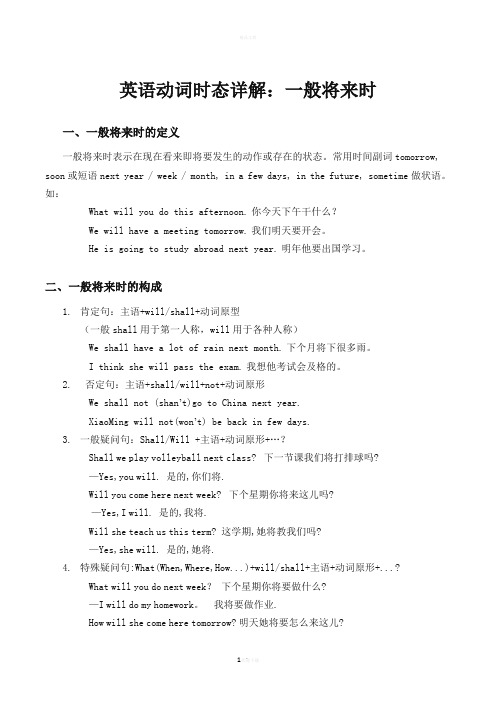
英语动词时态详解:一般将来时一、一般将来时的定义一般将来时表示在现在看来即将要发生的动作或存在的状态。
常用时间副词tomorrow, soon或短语next year / week / month, in a few days, in the future, sometime做状语。
如:What will you do this afternoon.你今天下午干什么?We will have a meeting tomorrow.我们明天要开会。
He is going to study abroad next year.明年他要出国学习。
二、一般将来时的构成1.肯定句:主语+will/shall+动词原型(一般shall用于第一人称,will用于各种人称)We shall have a lot of rain next month.下个月将下很多雨。
I think she will pass the exam.我想他考试会及格的。
2.否定句:主语+shall/will+not+动词原形We shall not (shan’t)go to China next year.XiaoMing will not(won’t) be back in few days.3.一般疑问句:Shall/Will +主语+动词原形+…?Shall we play volleyball next class?下一节课我们将打排球吗?—Yes,you will.是的,你们将.Will you come here next week?下个星期你将来这儿吗?—Yes,I will.是的,我将.Will she teach us this term?这学期,她将教我们吗?—Yes,she will.是的,她将.4.特殊疑问句:What(When,Where,How...)+will/shall+主语+动词原形+...?What will you do next week?下个星期你将要做什么?—I will do my homework。
英语语法一般将来时解析

否定句
I will not say= I won’t /wכnt/ say You will not see= You won’t see He will not think= He won’t think She will not talk= She won’t talk It will run 改否定句 … They’ll chat改否定句 … We’ll make改否定句 …
4、下周,我们要去苏州。
We will go to Suzhou next week.
5、她和她的母亲将在六月见面。
She will meet her mother in June.
6、Simon十分钟后将干什么?他将帮助妈 妈打扫房间。
What is Simon going to do ten minutes later? He’s going to help his mother clean the room
一般将来时
一、一般将来时的意义:
用来描述一个即将要发生的动作;谈 论未来的计划和打算。
二、一般将来时的基本结构:
will/shall+动词原形 be going to+动词原形
三、常见时间状语:
next Tuesday
tomorrow
next week
tonight
the coming Sunday in a few minutes
1、明天他将教我英语。
He’ll teach me English tomorrow.
2、他们下个星期带我们去他的花园。
They will take us to his garden next week.
3、将来,我要成为一个司机。
初中英语语法——一般将来时详细讲解
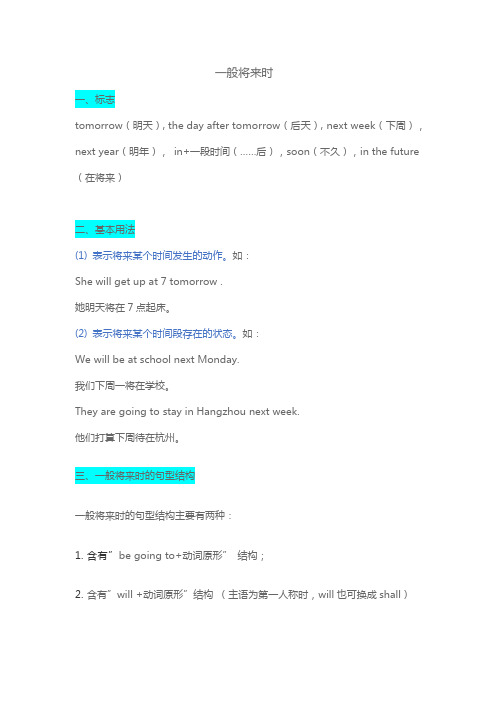
一般将来时一、标志tomorrow(明天), the day after tomorrow(后天), next week(下周),next year(明年),in+一段时间(……后),soon(不久),in the future (在将来)二、基本用法(1) 表示将来某个时间发生的动作。
如:She will get up at 7 tomorrow .她明天将在7点起床。
(2) 表示将来某个时间段存在的状态。
如:We will be at school next Monday.我们下周一将在学校。
They are going to stay in Hangzhou next week.他们打算下周待在杭州。
三、一般将来时的句型结构一般将来时的句型结构主要有两种:1.含有”be going to+动词原形”结构;2.含有”will +动词原形”结构(主语为第一人称时,will也可换成shall)(1)肯定句:She is going to buy some vegetables tomorrow morning . 她打算明天上午买一些蔬菜。
(2)否定句:在be动词后加not。
is和are可以和not缩写为isn't,aren't。
She isn’t going to buy any vegetables tomorrow morning . 她明天上午不去买蔬菜。
(3)一般疑问句及其答语:将be动词放在句子开头,且首字母要大写,句末用问号。
肯定回答:Yes,主语的相应代词+am/is/are.否定回答:No,主语的相应代词+am not /isn't/aren't.—Is she going to buy any vegetables tomorrow morning?她打算明天上午去买一些蔬菜吗?—Yes,she is./No,she isn't. 是的,她打算去。
一般将来时语法总结归纳
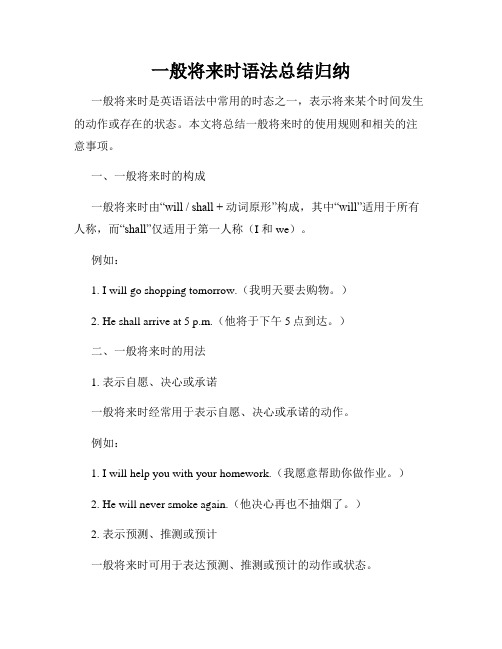
一般将来时语法总结归纳一般将来时是英语语法中常用的时态之一,表示将来某个时间发生的动作或存在的状态。
本文将总结一般将来时的使用规则和相关的注意事项。
一、一般将来时的构成一般将来时由“will / shall + 动词原形”构成,其中“will”适用于所有人称,而“shall”仅适用于第一人称(I 和 we)。
例如:1. I will go shopping tomorrow.(我明天要去购物。
)2. He shall arrive at 5 p.m.(他将于下午5点到达。
)二、一般将来时的用法1. 表示自愿、决心或承诺一般将来时经常用于表示自愿、决心或承诺的动作。
例如:1. I will help you with your homework.(我愿意帮助你做作业。
)2. He will never smoke again.(他决心再也不抽烟了。
)2. 表示预测、推测或预计一般将来时可用于表达预测、推测或预计的动作或状态。
例如:1. It will rain tomorrow.(明天会下雨。
)2. They will probably win the game.(他们很可能会赢得比赛。
)3. 表示习惯或反复发生的动作一般将来时可以用来表示根据过去的行为或事件推断将来会发生的动作。
例如:1. He will often call his parents.(他通常会给父母打电话。
)2. They will always eat dinner at home.(他们总是在家吃晚餐。
)4. 表示请求、邀请或建议一般将来时也可用于表示请求、邀请或建议的动作。
例如:1. Will you please close the window?(请你关上窗户好吗?)2. Shall we meet at the café?(我们要在咖啡馆见面吗?)三、注意事项1. 否定形式将"will not"缩写为"won't",放在动词之前。
“一般将来时”的几种语法形式

“一般将来时”的几种语法形式一般将来时是描述将来发生的动作、事件或状态的一种时态,表示将来一些时间或一些时刻发生的动作或状态。
在英语中,一般将来时有几种语法形式。
下面将详细介绍这几种形式。
1. will + 动词原形:这是一般将来时最基本、最常见的表达方式。
它主要用于表示意图、决定、预测、承诺等。
例如:- I will go to the supermarket tomorrow.(明天我会去超市。
)- She will travel to Paris next month.(下个月她会去巴黎旅行。
)- They will study for the test tonight.(他们会今晚为考试而学习。
)2. be going to + 动词原形:这种形式用于表示目的、计划、预测强烈以及基于现在的迹象或证据得出的行动。
例如:- He is going to visit his grandparents this weekend.(他计划在这个周末去看望他的祖父母。
)- They are going to buy a new car next year.(明年他们打算买一辆新车。
)- It looks like it is going to rain soon.(看起来很快就要下雨了。
)3. 动词原形: 当时间状语已经指明了将来,且主语是第一人称(I 或We)时,可以省略will或be going to,直接使用动词原形表示一般将来时。
例如:- I think I will pass the exam.(我认为我会通过考试。
)- We hope to see you next week.(我们希望下周见到你。
)4. be + going to + 动词原形:这种形式在第一人称(I或We)以外的主语中也可以使用,表示计划、安排、预测等。
例如:- He is going to start his new job next month.(他打算下个月开始新工作。
一般将来时语法知识点总结

一般将来时语法知识点总结一般将来时是表示将来发生的动作或状态的一种时态。
一般将来时的构成由助动词“will”(或情态动词“shall”在第一人称单数中)+动词的原形组成。
以下是一般将来时的相关知识点总结:1. 肯定句结构:主语 + will + 动词原形 + 其他。
例如:- I will go to the movies tomorrow.(我明天会去看电影。
)- She will help you with your homework.(她会帮你做作业。
)2. 否定句结构:主语 + will not / won't + 动词原形 + 其他。
例如:- They won't come to the party.(他们不会来参加派对。
)- He will not eat meat anymore.(他不再吃肉了。
)3. 疑问句结构:Will + 主语 + 动词原形 + 其他?例如:- Will you join us for dinner?(你会和我们一起吃晚饭吗?)- Will they visit their grandparents this weekend?(他们会在这个周末去看望他们的祖父母吗?)4. 表示计划或意愿:表示将来的某个时间或做某件事情的打算或意愿。
例如:- I will study abroad next year.(我明年将出国留学。
)- They will buy a new car soon.(他们很快会买一辆新车。
)5. 表示预测或推断:表示将来的某个状态或事件可能发生,基于推测或判断。
例如:- It will rain tomorrow.(明天会下雨。
)- She will probably pass the exam.(她可能会通过考试。
)需要注意的是,一般将来时有时可用于表示即将发生的动作,而不一定是将来的某个时间。
例如,当说话人决定或做出决定时,也可以使用一般将来时。
英语语法一般将来时 课件 (共35张PPT)

选择:要动动脑啦
1. My younger brother ____be 15 years old next year.
A. will B. is going C. should
2. — Sorry, I forgot to post the letter for you.
— Never mind, _____ post it myself tonight.
Vicky w__ill__be_ 15 years old next year.(be) Vicky 明年15岁了
Will 表示单纯“将要,将来会”无计划性,陈 述事实
三、句型变化 1. 肯定句: 主语+ will +V原型
I will be a teacher in the future. 2.否定句:主语 + will not(won’t)+V原型
be 随主语有am is are 变化
1. 肯定句: 主语 + be going to + V原型
I am going to fly kites the day after tomorrow.
2. 否定句:主语 + be not going to + V原型
She is not going to be a doctor when she grows up.
B: He will go to Australia. A:What will he do?
B: He will see kangaroos
2.be going to+动词原形
be going to ①表示计划,安排要做的事 ②表示现在的迹象推断未来可能
- 1、下载文档前请自行甄别文档内容的完整性,平台不提供额外的编辑、内容补充、找答案等附加服务。
- 2、"仅部分预览"的文档,不可在线预览部分如存在完整性等问题,可反馈申请退款(可完整预览的文档不适用该条件!)。
- 3、如文档侵犯您的权益,请联系客服反馈,我们会尽快为您处理(人工客服工作时间:9:00-18:30)。
一般将来时语法讲解集团文件发布号:(9816-UATWW-MWUB-WUNN-INNUL-DQQTY-
知识点
一、一般将来时表示将要发生的动作或存在的状态及打算、计划或准备做某事。
一般将来时由助动词shall或will加动词原型构成,shall 用于第一人称,will用于第二、三人称。
二.时间状语:tomorrow, next day(week, month, year…),soon, in a few minutes, by…,the day after tomorrow, etc.
三.基本结构:
1、肯定句
主语+am/is/are+going to + do;
will/shall + do.
2.否定形式:am/is/are not going to do ;
will/shall not do。
3.一般疑问句:be放于句首;will/shall提到句首。
例句:They are going to have a competition with us in studies.他们将有一场比赛和我们一起研究。
It is going to rain.天要下雨了。
四、注意
1、在时间或条件状语从句中,一般不能用将来时态,而用现在时态代替:
they’ll fight till they win complete victory.
i’ll be round to see you if i have time tomorrow.
2、表示将要发生的动作或情况,除了一般将来时外,还有一些其他结构和时态:
①. be going +不定式(表打算、准备作的事或即将发生或肯定要发生的事):
we ‘re going to put up a building here.
how are you going to spend your holiday?
who is going to speak first?
②. be +不定式(表示按计划安排要发生的事或用来征求对方的意见):
when is the factory to go into production?
the line is (going) to be opened to traffic next week.
am i to (=shall i ) go on with the work?
③.一般现在时(限于某些动词,表示按计划或时刻要发生的事):
school finishes on january 18th.
we get off at the next stop.
when does the winter vacation begin?
④.现在进行时(限于某些动词,表示按计划安排要发生的事):
we are having an english evening tonight.
they are playing some folk music next.
i am talking the children to the zoo (on sunday ).
3、在表示打算或准备时,如不提时间、条件等,多用be going to 这个结构,用一般将来时时很少的,特别是在口语中:
he is going to buy a dictionary.(很少说he will buy a dictionary.)
在谈即将发生的情况时,用be going to 这个结构也多一些。
在表示按计划安排要做得事时,用be to 的时候也不少。
另外还有将来进行时等时态也可表示将来的动作。
